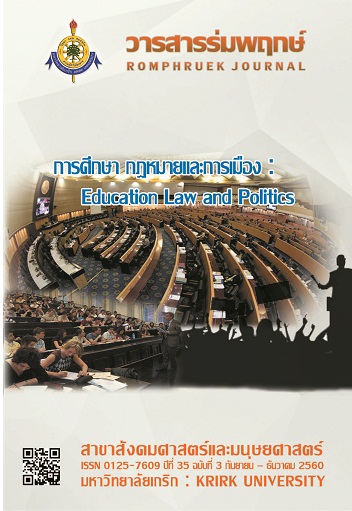A Scapegoat of the Criminal Case in the Retrial of Criminal Case : A Study of the Public Prosecutor Role
Main Article Content
Abstract
The problem of miscarriage of justice in the criminal case can be happened. Recognizing the probability of such error, many countries allow the reopening of criminal case after its final judgment. This procedure inevitably affects the principle of the judgment reliability. To restrict such consequence, it is necessary to impose a limited strict rules and conditions for the reopening of criminal case to only when the criminal case was found miscarriage of justice out of the state error. The public prosecutor, therefore, as the state agent to provide justice to people, has an important role in the retrial of criminal case after its final judgment. But in Thailand, The Retrial of Criminal Case Act B.E. 2526 (1983) has imposed a limited power of public prosecutor for only the retrial of criminal case that the public prosecutor is not plaintiff in the original case. Therefore, most defendants must resurrect the retrial of criminal case per se. As a result, they do not receive fairness from the justice system. Such indication is contrary to the nature of the criminal proceedings by state that the public prosecutor associate himself as the nominal prosecutor not the inquisitive one. That is to say it is not regarded as a win-lose matter to the defendant. He or she, in contrast must have objectivity. This is because the public prosecution of criminal case is not the litigation against two parties as the legal proceedings of civil suit. As a result, the litigation of the criminal case, the public prosecutor must also consider the benefits of the defendant. It is deemed appropriate to amend the Retrial of the Criminal Act B.E. 2526 (1983) by empowering the public prosecutor to be able to conduct the retrial of the criminal case without limited power to conform to the principle of public prosecution of various counties, such as France, Germany and Japan which allow the public prosecutor to be entitled to resurrect the retrial of criminal case after its final judgment to achieve fairness with presumed of innocent.
Article Details
Every article published in the Romphruek Journal of the Humanities and Social Sciences is the opinion and point of view of the authors. Thery're not the viewpoint of Krirk University or the editored department. Any part or all of the articles for pablication must be clearly cited.
References
โกเมน ภัทรภิรมย์. (2526). ระบบอัยการสากล. กรุงเทพฯ : ศรีสมบัติการพิมพ์.
โกเมน ภัทรภิรมย์. (2534). งานอัยการในกระบวนการยุติธรรม . วารสารอัยการ, 14(161) , 486.
กมล พัชรวนิช. (2521). ระบบอัยการของสหรัฐอเมริกา. วารสารอัยการ 1(12), 17.
คณิต ณ นคร. (2555). กฎหมายวิธีพิจารณาความอาญา. กรุงเทพฯ : วิญญูชน.
คณิต ณ นคร. (2536). แนวความคิดในการคุ้มครองสิทธิของบุคคลของพนักงานอัยการ. 100 ปีอัยการ, แห่งการสถาปนาสถาบันอัยการ 100 ปี โดย สำนักงานอัยการสูงสุด กรุงเทพฯ , 142.
คณิต ณ นคร. (2525). ปัญหาการใช้ดุลพินิจของอัยการ. วารสารอัยการ, 5(52), 57.
ทีมล่าความจริง (ช่องนาว26). (2560). ลุ้นรื้อคดี “แพะหนุ่มใบ้”สำเร็จครั้งแรกของประเทศ. (12 สิงหาคม 2560) สืบค้นเมื่อ http://www.now26.tv/view/102594.
ธานินทร์ กรัยวิเชียร. (2521). ศาลกับพยานบุคคล. กรุงเทพฯ : นำอักษรการพิมพ์.
นพพร โพธิรังสิยากร. (2524). การใช้ดุลพินิจของศาลในการลงโทษ. คณะนิติศาสตร์ จุฬาลงกรณ์มหาวิทยาลัย, กรุงเทพฯ.
นิภาพร รุจนรงค์. (2538). คดีเชอรี่แอน กระบวนการยุติธรรมจะคุ้มครองสิทธิและเสรีภาพของผู้บริสุทธิ์ได้อย่างไร. รายงานการเสวนาทางวิชาการ โดย สำนักงานอัยการสูงสุด กรุงเทพฯ, 6.
บัญญัติ สุชีวะ. (2507). ยกประโยชน์แห่งความสงสัยให้จำเลย. ดุลพาห, 11, 6.
มารุต บุนนาค. (2513). ชะตากรรมของจำเลยผู้บริสุทธิ์. บทบัณฑิตย์, 27, 62.
มารุต บุนนาค. (2518). การรื้อฟื้นคดีอาญาขึ้นพิจารณาใหม่. วารสารทนายความ, 17, 6.
สุจินต์ ทิมสุวรรณ. (2525). กรมอัยการกับการดำเนินคดีให้แก่รัฐ. กรุงเทพฯ : กรมอัยการ.
สุพร อิศรเสนา. (2544). การขอพิจารณาคดีใหม่ พ.ร.บ.รื้อฟื้นคดีอาญาขึ้นพิจารณาใหม่ การหนังสือทูลเกล้าถวายฎีกา. กรุงเทพฯ : นิติบรรณการ.
อรรถพล ใหญ่สว่าง. (2524). ผู้เสียหายในคดีอาญา. คณะนิติศาสตร์ มหาวิทยาลัยธรรมศาสตร์, กรุงเทพฯ
อรุณี กระจ่างแสง. (2532). อัยการกับการสอบสวนคดีอาญา. คณะนิติศาสตร์ มหาวิทยาลัยธรรมศาสตร์, กรุงเทพฯ
อำไพ วิจิตรเวชการ. (2527). การรื้อฟื้นคดีอาญาขึ้นพิจารณาใหม่. บทบัณฑิตย์, 41, 363.

